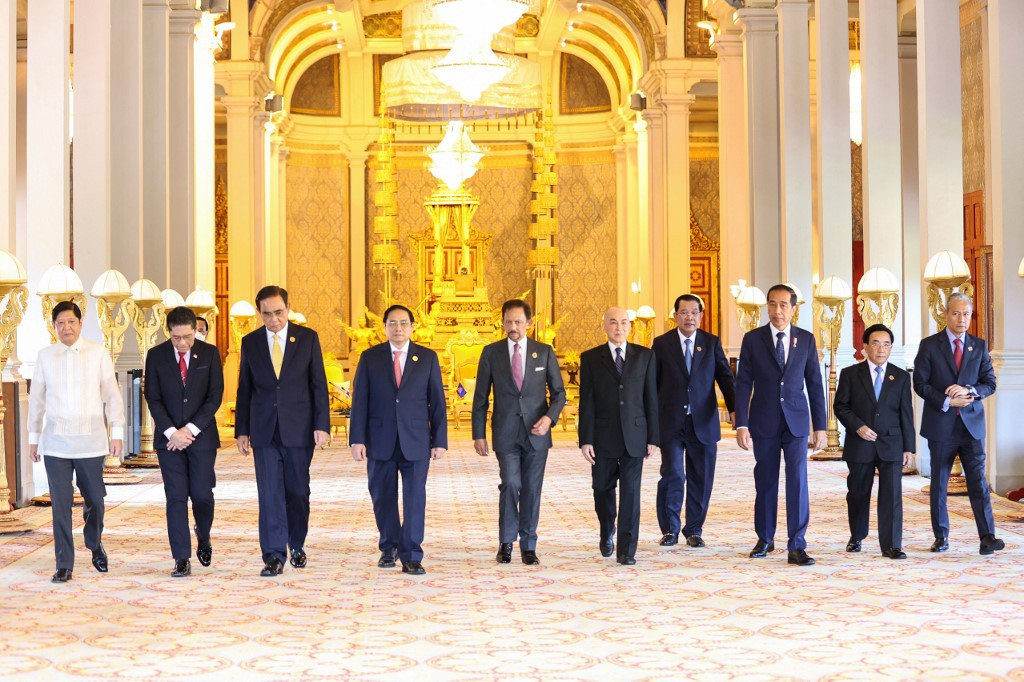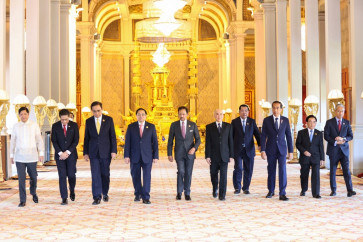Popular Reads
Top Results
Can't find what you're looking for?
View all search resultsPopular Reads
Top Results
Can't find what you're looking for?
View all search resultsMaintaining credibility, relevance of the ‘Council’ in Asia Pacific
The ARF has for years now been criticized for being unable to move forward from talking about confidence-building measures to providing preventive diplomacy outlines, let alone conflict resolution in the region.
Change text size
Gift Premium Articles
to Anyone
 Philippines' President Ferdinand Marcos Jr (left), Thailand’s Prayut Chan-O-Cha (third left), Vietnam’s Prime Minister Pham Minh Chinh (fourth left), Sultan of Brunei Hassanal Bolkiah (fifth left), Cambodia’s King Norodom Sihamoni (fifth right), Prime Minister Hun Sen (fourth right), Indonesia’s President Joko Widodo (third right), Lao Prime Minister Phankham Viphavanh (second right) and Malaysia's lower house speaker Azhar Azizan Harun (right) walk during a courtesy call to Cambodia's king before the ASEAN summit in Phnom Penh on Nov. 10, 2022.
(AFP/Kenn Sovanarra)
Philippines' President Ferdinand Marcos Jr (left), Thailand’s Prayut Chan-O-Cha (third left), Vietnam’s Prime Minister Pham Minh Chinh (fourth left), Sultan of Brunei Hassanal Bolkiah (fifth left), Cambodia’s King Norodom Sihamoni (fifth right), Prime Minister Hun Sen (fourth right), Indonesia’s President Joko Widodo (third right), Lao Prime Minister Phankham Viphavanh (second right) and Malaysia's lower house speaker Azhar Azizan Harun (right) walk during a courtesy call to Cambodia's king before the ASEAN summit in Phnom Penh on Nov. 10, 2022.
(AFP/Kenn Sovanarra)
O
n Dec. 8-9, the Council for Security Cooperation in the Asia Pacific (CSCAP) resumed its in-person meetings in Jakarta for the first time since the COVID-19 pandemic struck. Following its 57th Steering Committee Meeting on Dec. 7, the CSCAP celebrated its return-to-normal in-person meeting by organizing the 13th General Conference.
Indonesia, with the Centre for Strategic and International Studies (CSIS) acting as its member committee, was selected to host these meetings, especially since Indonesia will assume the ASEAN chairmanship next year. Furthermore, the CSCAP meetings and conference this year took place in the ASEAN Secretariat premises. Such a selection indeed reflects an already high expectation for Jakarta to play an effective leadership role in the region and for ASEAN to prove its centrality and relevance in today’s regional dynamics.
The CSCAP is a two-track network consisting of scholars, officials and other security experts and practitioners in their private capacities in which participants gather to discuss prominent security issues and challenges in the region. Its membership includes representatives from Australia, Brunei Darussalam, Cambodia, Canada, China, the European Union, India, Indonesia, Japan, the Democratic People’s Republic of Korea (DPRK), the Republic of Korea (ROK), Lao PDR, Malaysia, Mongolia, New Zealand, Philippines, Russia, Singapore, Thailand, the United States and Vietnam.
Such a formation almost mirrors membership of the ASEAN Regional Forum (ARF), to which the CSCAP activities and product have been mostly channeled in the past. As much as the ARF has been claimed as the most inclusive, e.g. since the DPRK still maintains its membership status, the CSCAP has also relied on a similar range of membership as a network of the regional security “epistemic community”.
Key individuals of the CSCAP in the past such as Paul Evans claim that with such a configuration and its ability to influence policymaking processes at the Track I level, the CSCAP network essentially plays an important role in forming a consensus among policy elites and providing a rationale for regionalism in security areas in Asia-Pacific.
A prominent international relations scholar, Peter Katzenstein, regards the CSCAP as the most important Track II dialogue on Asia Pacific security. The CSCAP’s key strength remains the participation of key individuals and academic elites, which to some extent may become the basis of authoritative sources of knowledge.
However, this is not without challenge. In the past decade or two, the CSCAP has been struggling to assert its relevance and effectiveness in shaping the course of security policymaking in the region. There are some reasons and indications for this.


















